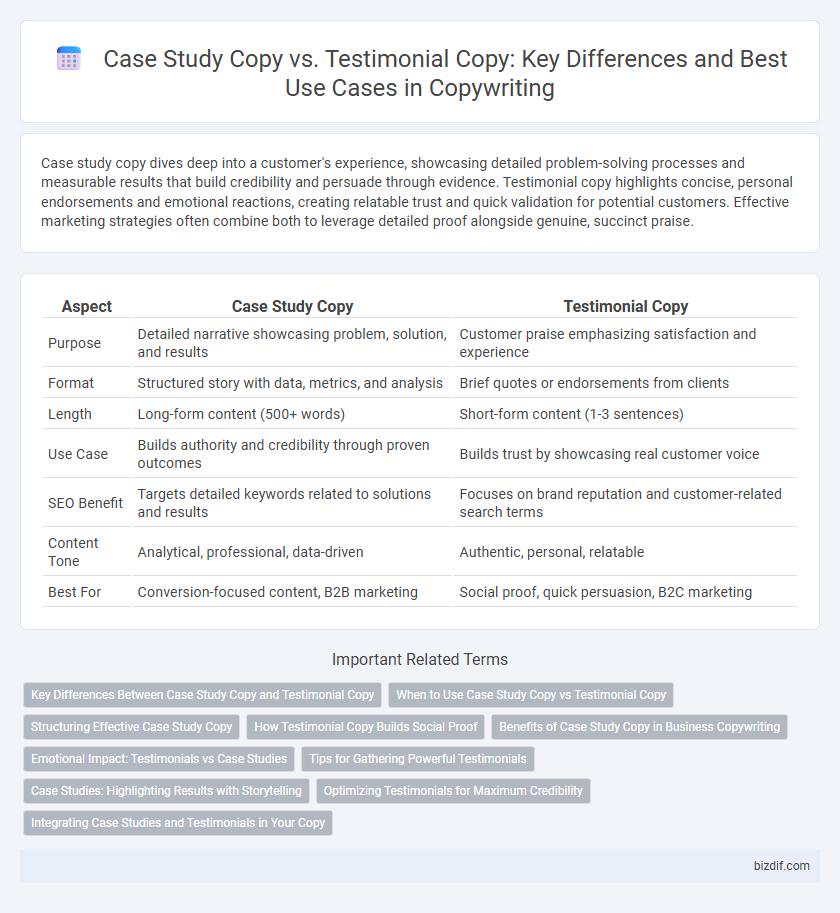Case study copy dives deep into a customer's experience, showcasing detailed problem-solving processes and measurable results that build credibility and persuade through evidence. Testimonial copy highlights concise, personal endorsements and emotional reactions, creating relatable trust and quick validation for potential customers. Effective marketing strategies often combine both to leverage detailed proof alongside genuine, succinct praise.
Table of Comparison
| Aspect | Case Study Copy | Testimonial Copy |
|---|---|---|
| Purpose | Detailed narrative showcasing problem, solution, and results | Customer praise emphasizing satisfaction and experience |
| Format | Structured story with data, metrics, and analysis | Brief quotes or endorsements from clients |
| Length | Long-form content (500+ words) | Short-form content (1-3 sentences) |
| Use Case | Builds authority and credibility through proven outcomes | Builds trust by showcasing real customer voice |
| SEO Benefit | Targets detailed keywords related to solutions and results | Focuses on brand reputation and customer-related search terms |
| Content Tone | Analytical, professional, data-driven | Authentic, personal, relatable |
| Best For | Conversion-focused content, B2B marketing | Social proof, quick persuasion, B2C marketing |
Key Differences Between Case Study Copy and Testimonial Copy
Case study copy provides in-depth analyses of customer experiences, highlighting specific challenges, solutions, and measurable results that demonstrate product or service effectiveness. Testimonial copy offers concise, personalized endorsements that emphasize customer satisfaction and emotional appeal through direct quotes or short narratives. Case studies focus on storytelling with data-driven insights, while testimonials prioritize authenticity and quick credibility boosts.
When to Use Case Study Copy vs Testimonial Copy
Case study copy is most effective for demonstrating comprehensive problem-solving processes and showcasing detailed results with data, ideal for B2B audiences or complex products. Testimonial copy works best for quick social proof, leveraging authentic customer experiences to build trust in simpler or high-volume sales contexts. Choosing between them depends on the sales funnel stage and the need for in-depth evidence versus concise validation.
Structuring Effective Case Study Copy
Structuring effective case study copy involves clearly defining the client's problem, detailing the implemented solution, and showcasing measurable results to build credibility and persuade potential customers. Unlike testimonial copy, which relies on direct customer quotes to establish trust, case study copy provides a comprehensive narrative supported by data and real-world outcomes. Emphasizing specific metrics, such as percentage increases in sales or reduction in costs, enhances the copy's impact and demonstrates tangible value.
How Testimonial Copy Builds Social Proof
Testimonial copy leverages authentic customer experiences and personal endorsements to build social proof, enhancing trust and credibility for a brand. By showcasing specific benefits and positive outcomes from real users, testimonial copy creates relatable, persuasive validation that influences potential buyers. This form of copywriting taps into psychological triggers like social validation, making prospects more likely to convert based on peer recommendations.
Benefits of Case Study Copy in Business Copywriting
Case study copy offers businesses persuasive storytelling that highlights real-world results and measurable outcomes, building strong credibility with potential clients. It provides detailed insights into problem-solving strategies, demonstrating the brand's expertise and boosting trust. Unlike testimonial copy, case studies engage readers by showcasing comprehensive evidence of success, driving higher conversion rates and informed purchasing decisions.
Emotional Impact: Testimonials vs Case Studies
Testimonial copy delivers a strong emotional impact by showcasing real customer experiences and personal stories that build trust and authenticity. Case study copy emphasizes data-driven results and problem-solving narratives, appealing to logical decision-making and credibility. Balancing emotional appeal in testimonials with factual evidence in case studies enhances overall persuasive power in copywriting.
Tips for Gathering Powerful Testimonials
Gathering powerful testimonials requires asking specific, outcome-oriented questions that encourage clients to share measurable results and emotional impact. Prioritize authentic, detailed responses by requesting stories about challenges faced, solutions provided, and the tangible benefits experienced. Use diverse formats such as written quotes, video recordings, and social media feedback to enhance credibility and engagement in testimonial copy.
Case Studies: Highlighting Results with Storytelling
Case studies combine detailed storytelling with quantifiable results, creating compelling narratives that demonstrate a product's impact through real-world applications. By weaving customer experiences into structured formats, case studies provide persuasive evidence that builds trust and showcases problem-solving capabilities. This data-driven approach enhances engagement and conversion by illustrating measurable outcomes linked directly to the product or service.
Optimizing Testimonials for Maximum Credibility
Testimonial copy enhanced with specific customer details, quantifiable results, and authentic voice significantly boosts credibility and trustworthiness in marketing content. Incorporating direct quotes, client names, and measurable outcomes transforms testimonials into powerful social proof that drives conversion rates. Optimizing testimonials through strategic placement and concise, relevant storytelling ensures maximum impact on prospective buyers.
Integrating Case Studies and Testimonials in Your Copy
Integrating case studies and testimonials in your copy enhances credibility by providing concrete results alongside authentic client experiences. Case study copy details specific challenges, strategies, and measurable outcomes, while testimonial copy adds emotional appeal and trust through personal endorsements. Combining both formats creates a balanced narrative that persuades potential customers by showcasing proven success and relatable satisfaction.
Case Study Copy vs Testimonial Copy Infographic

 bizdif.com
bizdif.com